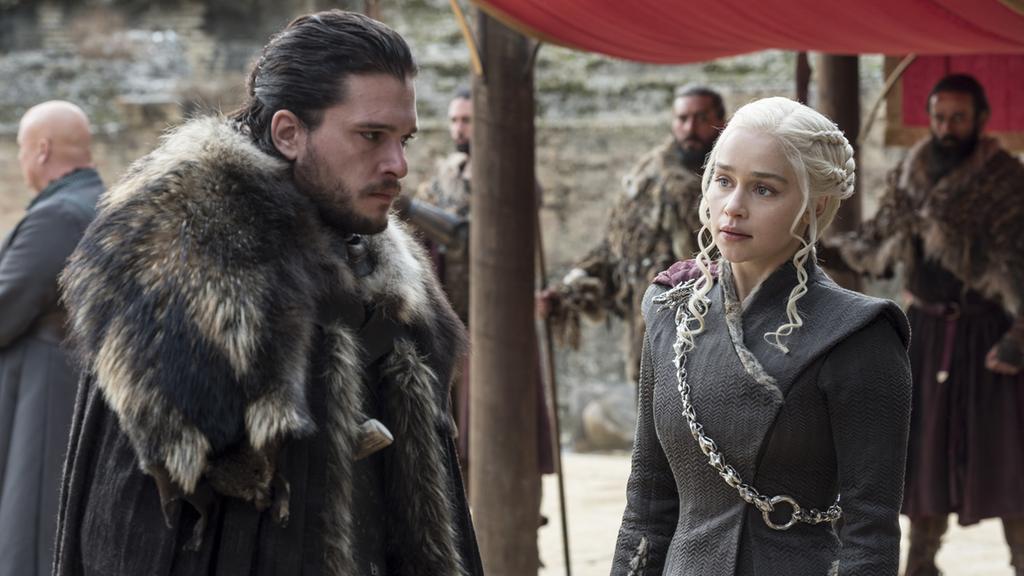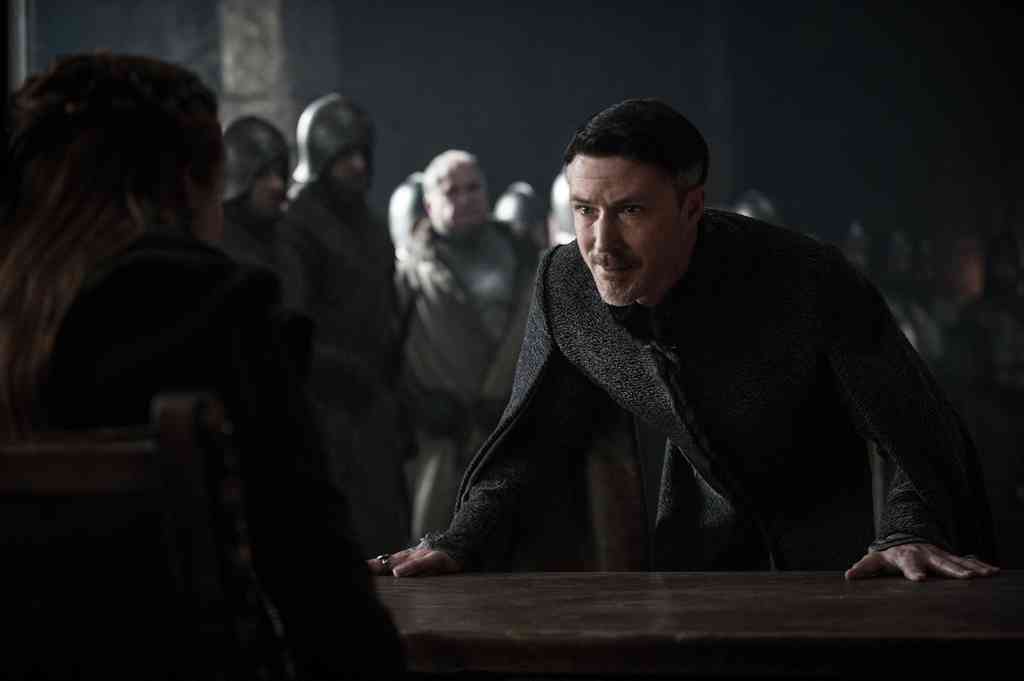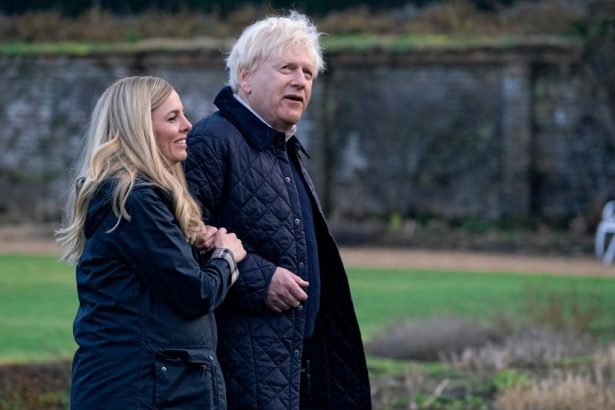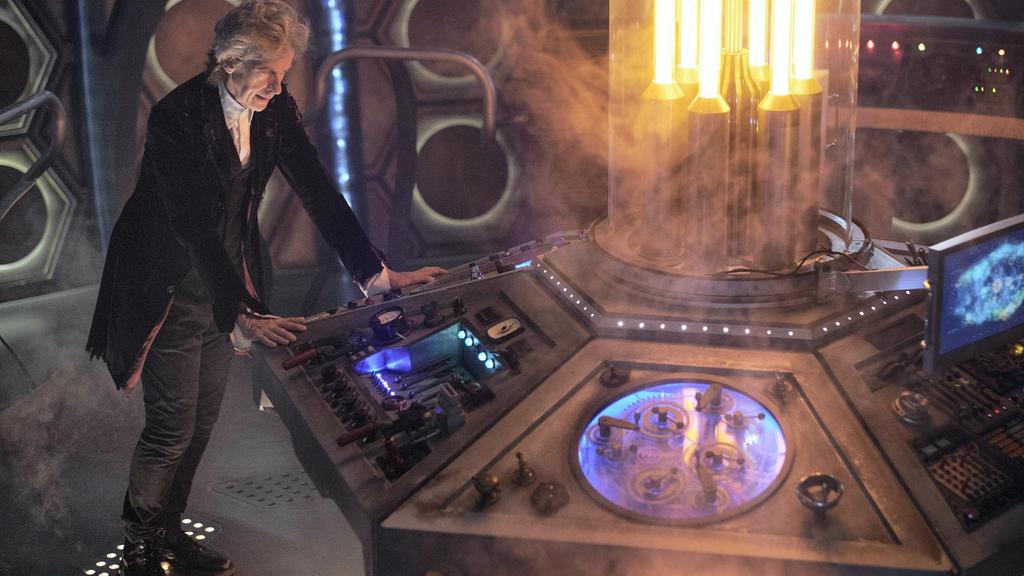For all the ice dragons breathing fire, throats bloodily cut or displays of royal cunning, it was left to a slightly weedy visionary to deliver the major twist in the Game of Thrones season finale at the weekend.
We won’t completely spoil the plot in the very first few paragraphs, but for 18-year-old Isaac Hempstead Wright, who plays Bran Stark, his character’s sensational revelation borne out of his ability to see into the past, present and future, summed up the allure of Game Of Thrones in an instant.
“There are so many different types of power in the Game Of Thrones world,” he tells The National. “But what’s really neat is that Bran, because he can dip into all of time in a moment, is one of the most powerful characters in the show, despite being one of the least physically imposing.”
Game Of Thrones may be bombastic, fantastical and by most measures the most popular drama on television, but it is to the show’s credit that it still has the power to surprise, seven seasons on.
John Bradley, who plays Samwell Tarley, – more of a thinker than a fighter – says he no longer reads the entire scripts, because he “likes watching it as a fan would”. And the season finale confounded expectations again.
In a series full of epic battles between warring factions, it was dark, wordy, tense and foreboding.
Apart from the public execution of one of the undead White Walkers which threaten to extinguish mankind, the assassination of the devious Lord Petyr “Littlefinger” Baelish, and a bloody fist fight, there was no huge set piece, just the promise, as the King in the North Jon Snow put it, that “the darkness is coming for us all”.
Actually, most fans seemed to like the more considered approach given it tied up many loose ends. Bran’s revelation that Snow was in fact the nephew of the Dragon Queen, Daenerys, just as he was, er, getting to know her a little better, had been the subject of chatroom gossip for months.
The machinations in dimly lit rooms and ruined castles that led to a temporary truce (supposedly) between the warring factions as they allied to take on the Night King and his army of White Walkers was fascinating – particularly when it later became clear that the Queen of the Seven Kingdoms, Cersei, had absolutely no intention of sending her Lannister army after all.
As Bradley explains, keeping the audience guessing is key to Game Of Thrones’ success.
“They killed the lead in the first season,” he laughs. “So when Ned Stark was beheaded, I think that was the moment people realised this show doesn’t play by the rules, abide by convention. It’s completely unpredictable – nobody is safe, and that one scene set the precedent.”
Which also percolates through to the actors. Liam Cunningham, who plays the ‘Onion Knight’ Davos, says he’s constantly fearful that the writers will “wake up one morning in bad humour and decide to kill me”.
“There’s not an actor in the show who doesn’t want to be in the last episode. It’s closing the circle, being an integral part of a timeless story, a benchmark in television.”
The season 7 finale was notable for one major character not making it to the end, however – the scheming Littlefinger caught out finally by his own lies, as Sansa used his words against him before her sister Arya slit his throat.
When we spoke before the finale, Aidan Gillen gave no indication of his grisly death – in fact he stood up for his character despite his slippery nature. “He has to show some charm, warmth and brightness otherwise people wouldn’t trust him – he’s not pure ambition,” he protested.
Gillen has felt able to include some of those traits as the seasons have progressed, and believes showrunners David Benioff and DB Weiss have been given more freedom as the series has overtaken George R R Martin’s books.
“They can write for the actors now,” he says.
And Cunningham agrees that the increased artistic freedom which has become increasingly apparent as the show became untethered from the books has been great for Benioff and Weiss – although he confirms that “they spent some time with George, who rolled out the end of the story for them, so they’re writing to the spirit of George’s intention”.
Not that season 7 has made what that end might be any clearer – both for actors or the audience.
“The problem is that we’re telling a story that we don’t know the ending of,” explains Bradley. “We genuinely don’t even know what type of story we’re telling a lot of the time. Is it a story which says ‘even in the blackest of times, good will prevail?’ Or does it tell us that ‘despite what good men do, bad guys can win if you let them’. That would be morally bankrupt wouldn’t it?
“Or, is it ‘nobody survives, no matter what’? We’re not quite sure.”
As White Walkers poured south of The Wall at the very end of the episode, however, the setting for Season 8 became increasingly clear. Not to annoy anyone who has sat through days of television to get to this point but Wright can boil Game Of Thrones down to two sentences.
“What’s been clever is that you have all this petty squabbling about the Iron Throne when really that is such an irrelevant problem in the face of the White Walkers,” he says. “There is only one fight in Game Of Thrones and that’s between humans and the dead…”
Such petty squabbling, however, is what will keep the chatboards busy in the 18 long months until the final season is broadcast.
Will Jon Snow’s paternity issue – he is now rightful heir to the Iron Throne – cause complications (if he finds it out)? Will Cersei finally order the death of her brother (and lover) Jaime, despite carrying his child?
“I was asked to sum up Game Of Thrones in three words recently, and I said ‘fathers and children’,” says Bradley. “That’s mainly what it’s about, core relatable principles. And that’s why fantasy is so popular globally, because it’s nobody’s reality, but it deals with universal ideas.”
It’s somehow apt that an actor whose character is Game Of Thrones at its blunt best – The Hound (Rory McCann, not an actual hound) – can best sum up what might be to come.
“The scale has gone up, the budget’s gone up, the battles are getting bigger and you can kind of imagine that with the sewing up of this saga that the writers are not going to hold back. Basically the big evil is coming from the North.”
Not that he’s going any further: despite all the headlines about hacks, McCann’s stock response to any fan questions is simple. “Deny, deny, deny!”
“I get people asking me all the time what’s going to happen,” adds Cunningham. “Sometimes I feel a bit naughty and say ‘OK, I’m going to tell you right now’. And then they’re immediately going, ‘No, don’t!’. It’s funny.”
And that’s the thing about Game Of Thrones – it’s genuine event television that inspires great curiosity and huge loyalty.
“We’re one of the few shows that has got better every year,” says Bradley. “We always have to outdo the previous season – and every year you do think that’s possible.”
Game Of Thrones Season Seven: A Bluffers Guide
Want to sound on message about the biggest show on television without actually watching it? Best not to get locked into the labyrinthine tales of revenge and royalty: as Isaac Hempstead Wright put it, all you really need to know from now on is that there’s going to be a huge fight between humans and the armies of undead White Walkers.
The season ended with a dragon captured by the Night King blowing apart the huge wall of ice that separates the human world from its less appealing counterpart. Not that some of the humans in Westeros have been particularly appealing, either.
Anyway, the White Walkers are now free to cause any kind of havoc they wish, and as Liam Cunningham told us: “Westeros may be zombie land after the Night King has finished.” If the various human factions don’t put aside their differences in season 8, we could be looking at The Walking Dead: The Medieval Years.



